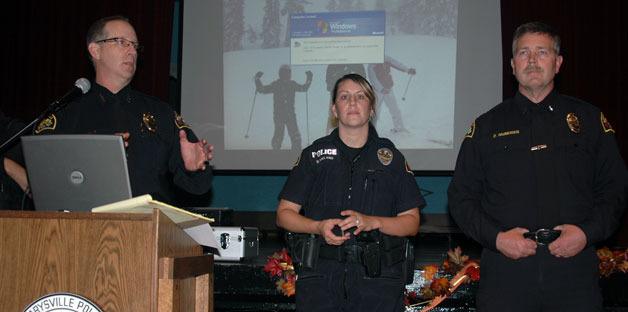MARYSVILLE — Illegal drug use received a spotlight during the first in a planned series of public interest forums for the Marysville community.
Marysville Police Chief Rick Smith noted that the drug overdose death of a Marysville Getchell High School junior in June of this year demonstrated that illegal drug use is indeed a problem in Marysville, as it is across the country.
“In countless TV shows and movies, illegal drug use is glorified and treated as part of our culture,” Smith said. “Drug abuse perpetuates other crimes, as addicts steal to buy their drugs. When cops have to deal with drug-related crimes, that leaves them with less time and resources to deal with others. It takes away from the safety of a community.”
Marysville Police Sgt. Brad Akau, of the four-member N.I.T.E. team — with “N.I.T.E” standing for neighborhood livability, intelligence and investigations, targeted enforcement and arresting offenders and education — explained that Marysville’s location on the I-5 corridor makes it a potential way station to those seeking to smuggle drugs as far north as Canada and as far south as Mexico.
“I’ve seen kids so addicted that they’re carrying $10,000 and $15,000 habits,” Akau said. “Some of these are kids I’ve coached in youth sports. We don’t want to punish the addicts. We want to punish the ones that sell to them.”
Marysville Police School Resource Officer Bronwyn Kieland considers counseling kids as much a part of her job as serving as a resource for parents and teachers. She urged adults to pay attention to physical, behavioral and emotional signs of potential drug abuse among young people, including dilated or pinpoint pupils, unexplained weight loss or gain, constant crying or inappropriate laughter, hidden phones or Facebook accounts, and “acting out” such as skipping school or stealing.
“Some signs, like having a quick temper or being secretive, might seem like typical teenage behavior, but what you have to ask yourself is, what’s normal for your child?” said Kieland, who encouraged parents to search their children’s rooms and belongings, and to “friend” their children on Facebook. “Don’t let them deflect when you ask them questions, and remember that it’s your house and your stuff. You’re paying for all of it.”
Marysville Police Lt. Darin Rasmussen warned against letting old medications linger in your house, especially prescription drugs. He identified 27 drug take-back sites in Snohomish County, including the Marysville and Tulalip Tribal police departments, and urged those in possession of controlled substances to contact Patricia Duemell, with the Marysville Police Department, to set up an appointment to turn over those substances.
“Get involved and know your own community,” Rasmussen said. “Establish who belongs and who doesn’t in your neighborhood. Organize a neighborhood watch. We’ll provide a free presentation to help you get started. If you don’t do it, there’s no guarantee that anyone else will.”
Michele Rastovich, program coordinator of the Snohomish County Community Mobilization Program, pointed to evidence that part of the “drug problem” among young people stems from the attitudes that kids perceive in adults.
“Last October, 96 percent of sixth-graders we surveyed said that they thought grown-ups think illegal drugs are bad,” Rastovich said. “Of the 12th-graders we surveyed at the same time, 25 percent said that they thought adults don’t think drugs are that big of a deal.”
Rastovich believes that young people need to be treated as community assets, rather than as community problems, to reinforce their positive behavior.



